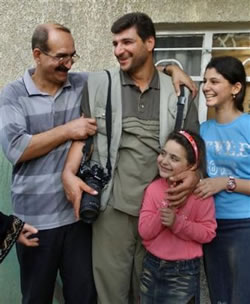 The U.S. military's indefinite detention of an Associated Press photographer in Iraq, without charges, is an outrage and should be seen as such by the journalistic community, AP editors said Friday.
The U.S. military's indefinite detention of an Associated Press photographer in Iraq, without charges, is an outrage and should be seen as such by the journalistic community, AP editors said Friday."We are angry, and we hope you are, too," AP International Editor John Daniszewski told a gathering of the Associated Press Managing Editors.
In interviews, the leaders of APME and the American Society of Newspaper Editors shared frustration with the case of Bilal Hussein and said they would urge the Pentagon to release the photographer, who has been held by the military since April, or to provide the AP with justification for his continued detention. The president of the Associated Press Photo Managers, Steve Gonzales, said in an e-mail that his group would sign onto that effort, saying it understands "the necessity of unbiased visual journalism in theaters of conflict."
The AP similarly has called for the military to release the photographer or charge him with a crime.
Hussein was arrested in April and accused, "vaguely," of being a security threat, said Santiago Lyon, the AP's director of photography. The military has said Hussein was in the company of two alleged insurgents. Daniszewski said that when the news cooperative pressed for further details, the best it could learn was that Hussein was allegedly involved in the kidnapping of two journalists by insurgents in Ramadi.
However, Daniszewski said the two journalists were asked by AP about the incident and that they recalled Hussein as a "hero," who helped evacuate them from harm's way.
Lyon said he reviewed Hussein's images and interviewed his colleagues and found nothing to suggest he was doing more than his job in a war zone. The vast majority of images depicts the realities of war, Lyon said, and "may be an inconvenient truth, but a truth nonetheless."
David Zeeck, president of ASNE and executive editor of The News Tribune, of Tacoma, Wash., called Hussein's detention without charges "contrary to American values."
"This is how Saddam Hussein dealt with reporters; he would hold them incommunicado," Zeeck said.
Some of Bilal Hussein's images were shown to the newspaper editors Friday. One showed a man sweeping up a blood-drenched floor; another, a row of four dead children and others of wounded Iraqis. Lyon said Hussein captured important and compelling images of the effects of war.
Hussein is an Iraqi national, as are nearly all AP journalists in the war-torn country, Lyon said. He also is one of about 13,000 men and women being detained in Iraq without getting a trial, Daniszewski said.
Suki Dardarian, deputy managing editor of The Seattle Times and outgoing president of the APME, said what's happened with Hussein could have a chilling effect on the work of other journalists. Hussein's detention has virtually halted the production of photographs from the dangerous region in which Hussein worked, Daniszewski said.
LSB: And don’t you think this was the real intention?
Photo: Bilal Hussein, center, a photographer for The Associated Press based in Fallujah, Iraq, visits with his brother Dr. Abdul Hadi, left, and Hadi's daughters Ban, 14, and Batool, 7, in Baghdad, Iraq, Sunday Nov. 14, 2004.







No comments:
Post a Comment